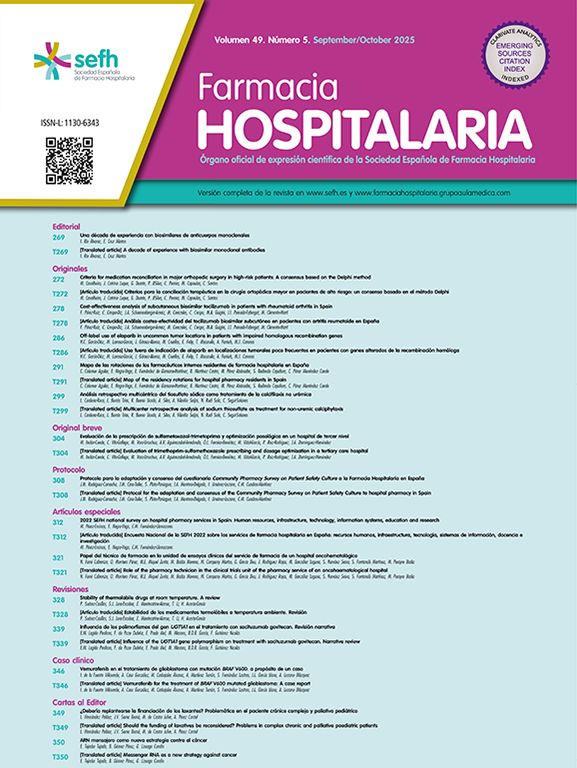Description and analysis of pharmaceutical interventions for patients with parenteral nutrition and an assessment of the degree of acceptance.
MethodProspective six-month study. Design of a data collection sheet (with personal data, the indication for parenteral nutrition, hospital area, nutrition type, time and type of intervention, type of notification, acceptance) for recording interventions carried out based on normal activities: complete review of pharmacotherapy and clinical history.
ResultsA total of 265 interventions were carried out during the study period (1.5 interventions/day) with a mean of 2.1 interventions/patient. The overall degree of acceptance was 83.77%; significant differences were found between type of communication for the intervention (oral and/or written) and the degree of acceptance.
ConclusionsAdding a pharmacist to the care team permits direct intervention in partnership with the doctor, and it is an effective method for preventing and resolving the complications, generally metabolic, that are associated with parenteral nutrition. Using this process for resolving medication-related problems in hospitalised patients, principally in surgical areas, is an addition to the pharmacist's activities in the area of nutritional support.
Descripción y análisis de las intervenciones farmacéuticas realizadas en el ámbito de la nutrición parenteral (NP) y valoración del grado de aceptación.
MétodoEstudio prospectivo de 6 meses. Se diseñó una hoja de recogida de datos (datos personales, indicación de NP, sala de hospitalización, tipo de nutrición, momento y tipo de intervención, modo de notificación y aceptación) en la que se registraron las intervenciones realizadas a partir de la actividad diaria: revisión completa de la farmacoterapia y de la historia clínica.
ResultadosSe realizaron un total de 265 intervenciones en el período de estudio (1,5 intervenciones/ día) con una media de 2,1 intervenciones/paciente. El grado global de aceptación fue del 83,77%, fueron significativas las diferencias encontradas entre el tipo de comunicación de la intervención (oral y/o escrita) y el grado de aceptación.
ConclusionesLa integración del farmacéutico en el equipo asistencial permite una intervención directa con el médico, y es un método eficaz para la prevención y resolución de complicaciones asociadas a la NP, principalmente de tipo metabólico. Utilizar este proceso para resolver problemas relacionados con la medicación en los pacientes ingresados, principalmente en salas quirúrgicas, proporciona una calidad añadida a la actividad del farmacéutico en el área del soporte nutricional.
This study has been presented in part at the LIII Congreso Nacional de la Sociedad Española de Farmacia Hospitalaria held in Valencia from 21 to 24 October 2008.





